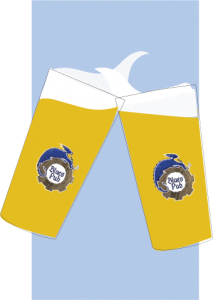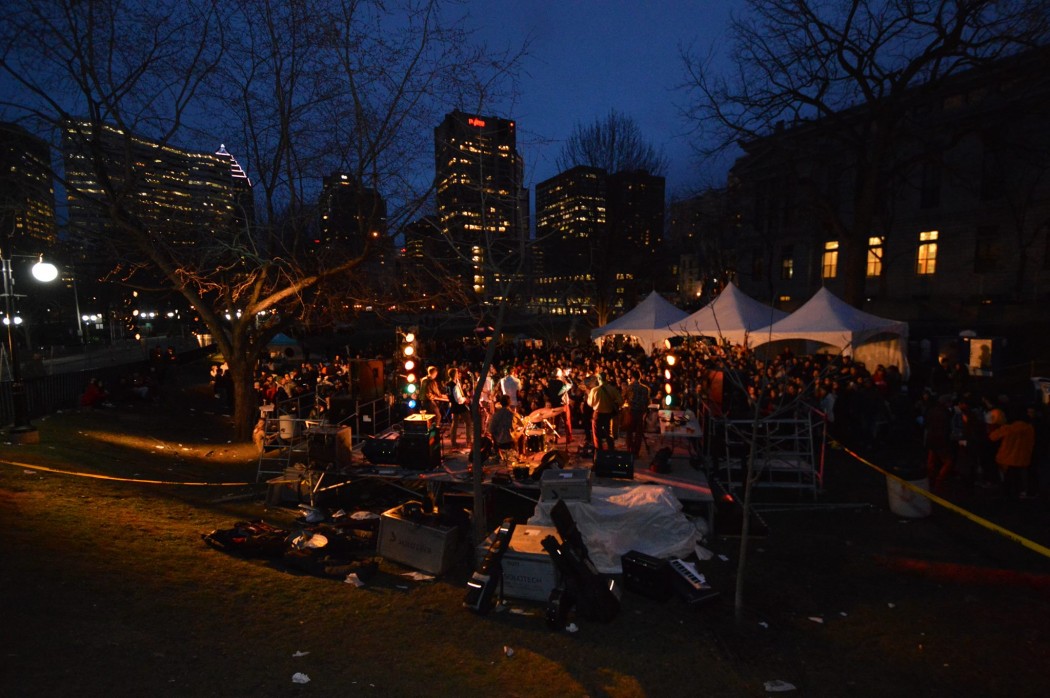*Names changed or withheld to protect anonymity
In a city known for vibrant nightlife and the lowest legal drinking age in Canada, it seems understandable that alcohol-fueled activities foster a unique school spirit at McGill. Yet common slogans such as “Work hard, play hard” and, “It’s not alcoholism ‘till you graduate” don’t apply to the entire student body.
Exploring the dimensions of McGill drinking culture, The Bull & Bear spoke to student organizers about the significance of McGill drinking events to the student body, as well as to non-drinkers about where they find themselves in the school community.
Alcohol in the Institutional Context
Much of McGill’s community and nightlife revolves around drinking, with the school’s most popular activities being faculty pubs, apartment crawls, and MDOPs (multi-day organized parties), all of which are student-run. For many around the school, these events act as a necessary way to build community.
“[McGill] is a wet campus where everyone can drink, and if we can do it on campus, [drinking] brings everyone together,” said Ethan Casey co-chair of Bars des Arts (BdA). BdA is a weekly faculty pub that currently finds itself without a home as the Arts Lounge undergoes construction.
Mercedes Labelle, BdA’s other co-chair, agreed, adding, “Despite serving alcohol, the main purpose of these events is to give students a safe and welcoming environment to interact with people they otherwise wouldn’t have the opportunity to.” She continued, “while we’re not perfect and do have some work to do on making our bar more inclusive, we do provide a safe space for drinkers and non-drinkers alike to meet and talk.”
Arguing that MDOPs can be a strong outlet to relax “in more ways than just the alcohol,” SSMU VP Internal Sanchi Bhalla explained, “after back-to-back midterms on complex economic theories, getting on stage and seriously, passionately arguing [over], ‘Is Spongebob dry or wet?’ is a great way to give your brain a break.”
Casey, LaBelle, and Bhalla all emphasized a similar point: drinking alcohol is not unique to McGill. Casey even theorized that the drinking culture may be more pervasive at other universities. She said, “I think if you go to any other school, the drinking is even more intense because people are pressured to drink off campus, similar to North America, where there is a drinking age, so you almost feel bad-ass drinking at a young age.”
Alcohol may be a ubiquitous facet of university life, but popular school administration and student-sponsored drinking events set McGill apart. In fact, student-led initiatives often prioritize hosting events where alcohol is served.
 U2 Science student “Maya,”* who does not drink, holds an executive position on a departmental council. Maya explained that this year, her council has held only one non-drinking event, despite her having repeatedly suggested ideas for more.
U2 Science student “Maya,”* who does not drink, holds an executive position on a departmental council. Maya explained that this year, her council has held only one non-drinking event, despite her having repeatedly suggested ideas for more.
“I spent a lot of meetings advocating for non-drinking events… but [I was] outnumbered in a council of individuals who all participate in binge-drinking events like Science Games, [so] it fell on deaf ears,” Maya said. She added, “even when non-drinking events were voted for, it felt like simply ticking a diversity check-box and not like there was any actual desire to host these events.”
Although Maya acknowledged that many McGill organizations attempt to provide “spaces to build community within clubs that are removed from drinking,” she also noted that for those seeking more non-drinking spaces, it is important to elect representatives who will advocate for these specific needs.
Hosting drinking events often boils down to finances. Bhalla explained that serving alcohol helps organizations make back the money they spend. “At least in our experience, students don’t want to spend money on dry events,” she said. She added that, “if it ever gets to a point where the culture changes such that Faculty Olympics… start bleeding money instead of bringing in revenue… of course there will be a change in the programming.”
The Sober Student Experience: A Night in the Life
One factor that allows McGill to have a popular drinking culture is Quebec’s drinking age. This allows students to legally drink “practically from the minute they get to McGill,” as Labelle pointed out. This was in reference to Frosh, McGill’s typically alcohol-soaked welcome to the university experience.
In a move towards increased inclusivity, McGill now offers multiple alternative Frosh experiences, such as Rad Frosh, Outdoor Frosh, and Fish Frosh, a dry frosh hosted by Montreal Christian groups. Still, for sober students who choose to attend other Frosh weeks, the experience is often flawed.
“Frosh was a nightmare and I felt very marginalized and judged because I wasn’t craving alcohol at… seven in the morning,” confessed U2 Arts student “Campbell,”* who attended Arts Frosh. Adding that the pressure to drink was the highest during this week, she continued, “if I could do it again, I’d definitely choose either not to do Frosh or do [a dry frosh].”
It doesn’t mean I’m stuck up, have trauma, or have something I want to hide; I just don’t like drinking alcohol, that’s really it.
U3 Science student Louis recalled that, despite having attended a Frosh that advertised itself as separate from the clubbing and binge-drinking common to faculty froshes, members of his Outdoor Frosh group brought cases of beer and began drinking at night.
“The way McGill tries to initiate integration into the university is really centered around the shared experience of drinking,” Louis said. He explained further, “what I feel, and what I think a lot of other people who don’t drink feel, is that if you don’t participate in that culture, that rather than acting as a force of integration, [Frosh] acts like a force of repulsion from the community.”
After the festivities of first year and Frosh, social life can become easier for non-drinking students, as they often find more accepting friend groups and solidify their social groups after moving out of student residences.
“I feel so much less pressure now that I live in my apartment rather than in [New Residence],” Campbell said. She explained, “I honestly don’t mind people drinking, I just don’t like feeling left out because I don’t.” Of her current roommates, a group which included both sober and non-sober students, Campbell said, “we still go out and invite our friends often, but I don’t feel like I need to drink to make friends anymore, which is nice.”
While the students interviewed cited a wide range of reasons for staying sober— from religious principles, to family histories of substance abuse, to medical necessity, to simply personal preference— each reported having an active social life with some combination of working, extracurriculars, studying, and spending time with friends. When going out, they visit Montreal’s restaurants, concerts, festivals, and other events.
Some, however, also feel that their experiences might differ from that of the average university student. Louis said, “my friendships are much more one-on-one, which might stem from the fact that I don’t really have the scene that alcohol provides, for a large group of people to have an excuse to get together.”
U3 student Tinoli voiced a similar sentiment in saying, “[when] I do form friendships and such on campus, my friends tend to be ones that are non-drinkers, like me. It’s just because we can hang out more often in dry environments, and I don’t have to feel awkward about denying requests to hang out at bars or whatnot.”
Maya primarily criticized the requests to justify her sobriety; she shared , “I really hate the shocked eyes, the vocalization of disbelief, and the insistence on why I could ever possibly not want to participate in the life changing experience that is getting shitfaced. It doesn’t mean I’m stuck up, have trauma, or have something I want to hide; I just don’t like drinking alcohol, that’s really it.”
A Need For New Spaces
Sober students at McGill have struggled to cultivate non-academic communities on campus, and the dominant presence of alcohol-driven activities like Frosh and BdA may contribute to this sense of isolation. The source of this issue may lie in the institutional failures to provide student solidarity and alternative social spaces.
Bhalla argued that these drinking events, “often provide a sense of school spirit that McGill sorely lacks… and are so unique to this university that’s become my adopted home.”
Administrative incompetencies when it comes to construction perhaps amplify the issue: Labelle cited the long-term closings of BdA, Gerts, and the SSMU building as contributing to McGill’s severe lack of community. “McGill is increasingly losing these community spaces… [and] is reverting back to solely being an academic institution,” she said.
She also suggested that these spaces provided students who didn’t drink with places on campus to socialize at night without having to club on Saint Laurent. According to Labelle, the lack of these spaces “won’t deter people who want to drink from drinking, but it will further isolate students who don’t drink but want a space to have meaningful peer-to-peer interaction without the time commitment of joining a club or sports team, etc.”
McGill is increasingly losing these community spaces.
But many of these community spaces may simply not be enjoyable for non-drinkers. As a Montrealer who commutes to campus, Tinoli said that because she “already has [a] social network made,” she chooses not to attend McGill’s drinking events “just because there doesn’t tend to be much more to do than drink.”
Similarly, Louis recalled, “‘Gerts ‘til it hurts’ [was] real. If you go, you’re going to be the only sober person there. Even if ostensibly it is inclusive, it’s not desirable.”
To improve McGill’s culture for drinkers and non-drinkers alike, Louis suggested providing more spaces for socializing on campus as alternatives to the library or after-hours nights in bars. He noted, “there are barely any spaces to talk to people where you aren’t supposed to be working; where you can have chance conversations with people you don’t know and that’s acceptable.”
“If you’re drinking, you might have the opportunity to have more acquaintances, [but]… whether or not you’re drinking, finding deep relationships is extraordinarily difficult at McGill,” Louis stated. He continued, “I think that’s a structural thing.”








